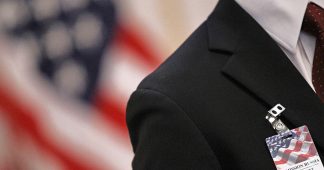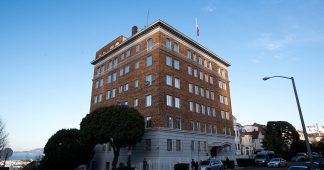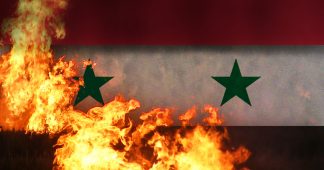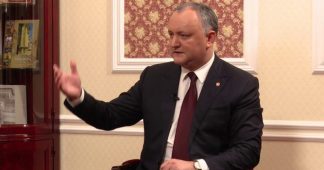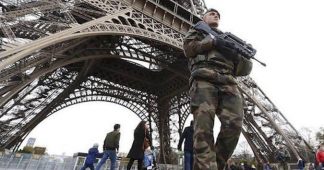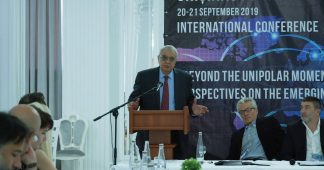CHISINAU FORUM III
Arnaud Develay, international lawyer, Washington and Paris bar
Hello and thank you to everyone for having taken the time to come and exchange with us here in CHISINAU.
I wish to particularly extend my gratitude to our friend and comrade IURIE ROSCA for his impeccable organization of this important event.
The CHISINAU Forum aims to bring together those amongst us who feel compelled to preserve the flickering light of sovereignty and national independence in our respective countries.
Eighteen years after the attacks on the World Trade Center on September 11th 2001, the globalist leviathan appears bent on accelerating the process of utterly dismantling the international legal order born out of the ruins of WW2.
As they begin to realize that its project of mass hypnosis exerted on the masses is slowly unraveling owing to its internal contradictions, the proponents of the forced-upon unipolar order have revealed their true intent through their drive to shatter the rules of international law.
While these rules have never been perfect, they at least had the merits of providing a relative stability, the latter now threatening to fade into oblivion ever since the end of that decade-long window of opportunity which began to close only a mere 10 years following the Fall of the Berlin Wall.
As such, the supposedly Golden Age of what had once been theorized by FUKUYAMA as the End of History and the Triumph of Liberalism has nowrevealed itself to be but a large-scale heist leading to the pauperizing of the millions of people who once made up the middle-class.
The unleashing of this juggernaut was however rendered possible only through a systematic dismembering of the legal architecture at the core of the political order in our once sovereign nation-states.
This in turn begs the question: How did we get to this state of affairs?
While addressing a question from a journalist tending to query him on this most central thematic by asking him what he considered to be the most tragic event of the 20th Century, the President of the Russian Federation unabashedly replied: “The End of the Soviet Union.”
Vladimir Putin had long understood that only power-based equilibrium between powerful Nation-States could ensure respect for international law.
As power rivalries tend to enforce a salutary status-quo, it then becomes feasible to enforce the fundamental tenets of international law that are embodied inter alia in the twin pillars of the PACTA SUNT SERVANDA and OPINIO JURIS doctrines.
PACTE SUNT SERVANDAputs the emphasis on the enforcement of contractual promises as between States.
In this regard and whether States are interacting in a bilateral or multilateral framework, it is implied that the State-Parties are to negotiate in good faith so as to reach consensus on the interpretation to be given to every single clause of the accord.
The Vienna Convention on Diplomatic Relations is a prime example of the faithful application of PACTA SUNT SERVANDA.
To be sure, it would never occur to a State-Party to that Convention to violate the clause bearing on consular or diplomatic immunity afforded to a member of any diplomatic corps on the territory of the Host-Nation.
This principle applies notwithstanding the egregious nature of a felony committed on the territory of the Host-Nation by a representative of a Foreign-State.
Such a disregard for this core principle of immunity from prosecution would expose the transgressing state to having its own diplomatic personnel being detained by any other Contracting-Parties through their application of reciprocity so as to send a clear message of dissuasion to future potential violator of that norm.
The principle of reciprocity is thus a corollary to the respect of treaty obligations which acts as an accelerator of PACTA SUNT SERVANDA as it regulates the behavior of Contracting-States in a policing of the relations as between States.
These unstated rules are so deeply-ingrained in international customary law that it is not even required for them to be explicitly cited in treaty provisions.
The OPINIO JURIS Doctrine is the second most important pillar of international Law.
It posits that international customary law has two elements.
The first element is the existence of a widely shared practice of international law by the community of Nation-States.
The second element is the generally-shared subjective application of international law principles by Nation-States so that consensus rules the day as relates to legal interpretation and meaning.
In order for any treaty to have force of law in its essential principles, it is thus necessary that it be perceived as an integral part of the corpus of international law as the latter is perceived to apply not only to the Contracting Parties but also by the whole of the international community of Nation-States, even those that may not have ratified it.
By extension, OPINIO JURIS is to perceived as being of an even more fundamental import in cases when the law is silent.
Where neither jurisprudence nor positive law exists to shine a light on the practice of States, we refer to a state of NON LIQUET.
NON LIQUET may generate a perversion of the law in that it makes it tempting for states to take liberties with existing legal principles which are still bordering the areas of the legal vacuum.
The most infamous precedent of this perversion is the so-called doctrine of the “enemy combatant”.
In the wake of the attacks on the World Trade Center, the United States unilaterally introduced a doctrine allowing for the disregard of humanitarian law principles embodied in the Geneva Conventions as well as international customary law as it embarked on its so-called War on Terror.
Feeling free to act as the then sole hegemon, the US government introduced the notion that protections normally afforded to military combatants bore no relevance to individuals deemed to act beyond the pale as non-state actors carrying no distinctive insignia and having adopted non-recognized rules of conventional military engagement.
The adoption of the enemy combatant doctrine in turn triggered a series of jus cogens violations spanning the denying of rights associated to a fair trial and access to an attorney while being able to access incriminating evidence.
To make matters worse, the extraction of self-incriminating statements though the practice of torture was confirmed by the current head of the Central Intelligence Agency during her own confirmation hearings.
An additional level of illegality was reached when Washington opted to implement the program of extraordinary renditions.
These operations carried out by the US intelligence services provoked a barrage a criticism by legal scholars and led to foreign courts calling for the arrest and extraditions of violators so these could face charges on the territories of states, some of which were considered as allies of the United States.
The most regrettable side-effect of such lawlessness is that as it is carried out by one if not the most powerful state in the world, (Founding Member of the United Nations holding a permanent seat on the Security Council) it creates a precedent on the basis of which other states may feel compelled to act similarly and in time undermines the UN World system as a whole.
Once this process of unlawful legal actions is initiated it also becomes difficult if not impossible to revert to the status-quo ante.
It is in this context that one can better appreciate the unilateral withdrawal of the United States from the nuclear non-proliferation regime treaties that were the INF and ABM treaties.
Similarly, the pressure being applied by Washington to force Teheran to renegotiate the JCPOA even though Iran has been found to be in compliance with the treaty provision by none other that the International Atomic Agency underlines the level of sheer brazenness that has gripped Washington’s foreign policy.
Finally, it is this precedent of continued lawlessness that has emboldened some segments of the US deep state to impose a narrative predicated on phony intelligence in order to justify US military intervention in Iraq, Libya and mere recently Syria, all with the connivance of the corporate media.
It should be noted that with news media being concentrated within a few handsall closely-linked to the arm industry, this has greatly facilitated the task of the hoodwinking public opinion into accepting wars of choice for the last 2 decades.
To be sure, none of the mass protests against the installation of intermediate-range missiles in West Germany in 1983 as an example could be deemed possible today.
Similarly, it mattered not that over 15 millions people protested against the impending invasion of Iraq as this significant event was simply never picked up by the corporate media.
The result of all this sequence of events is that barely 20 years after September 11th; international security appears as fragile as it was prior to WW2.
Thank you for your attention.
Published at https://flux.md/stiri/arnaud-develay-the-rule-of-law-in-the-age-of-imperial-collapse-video#
